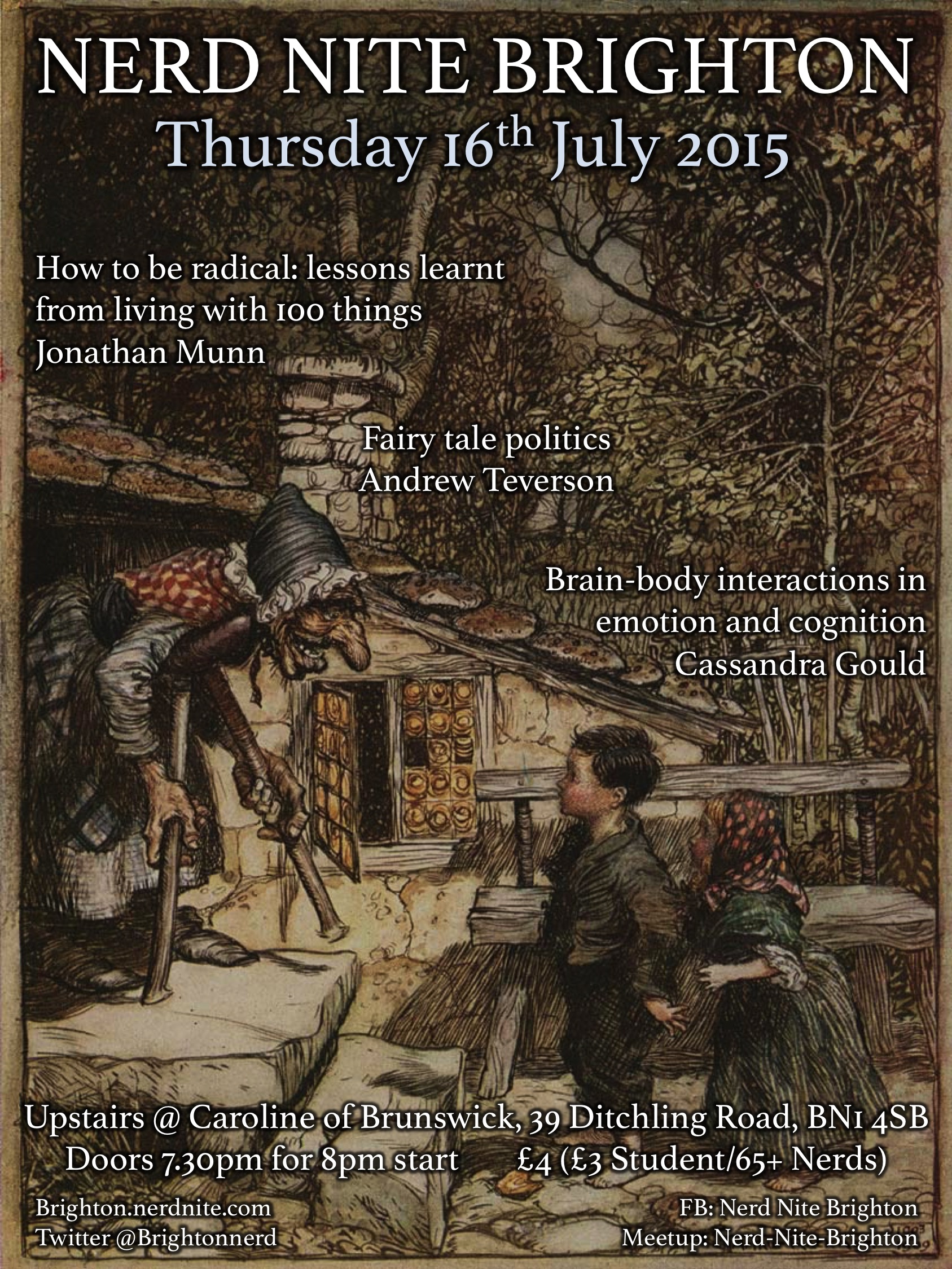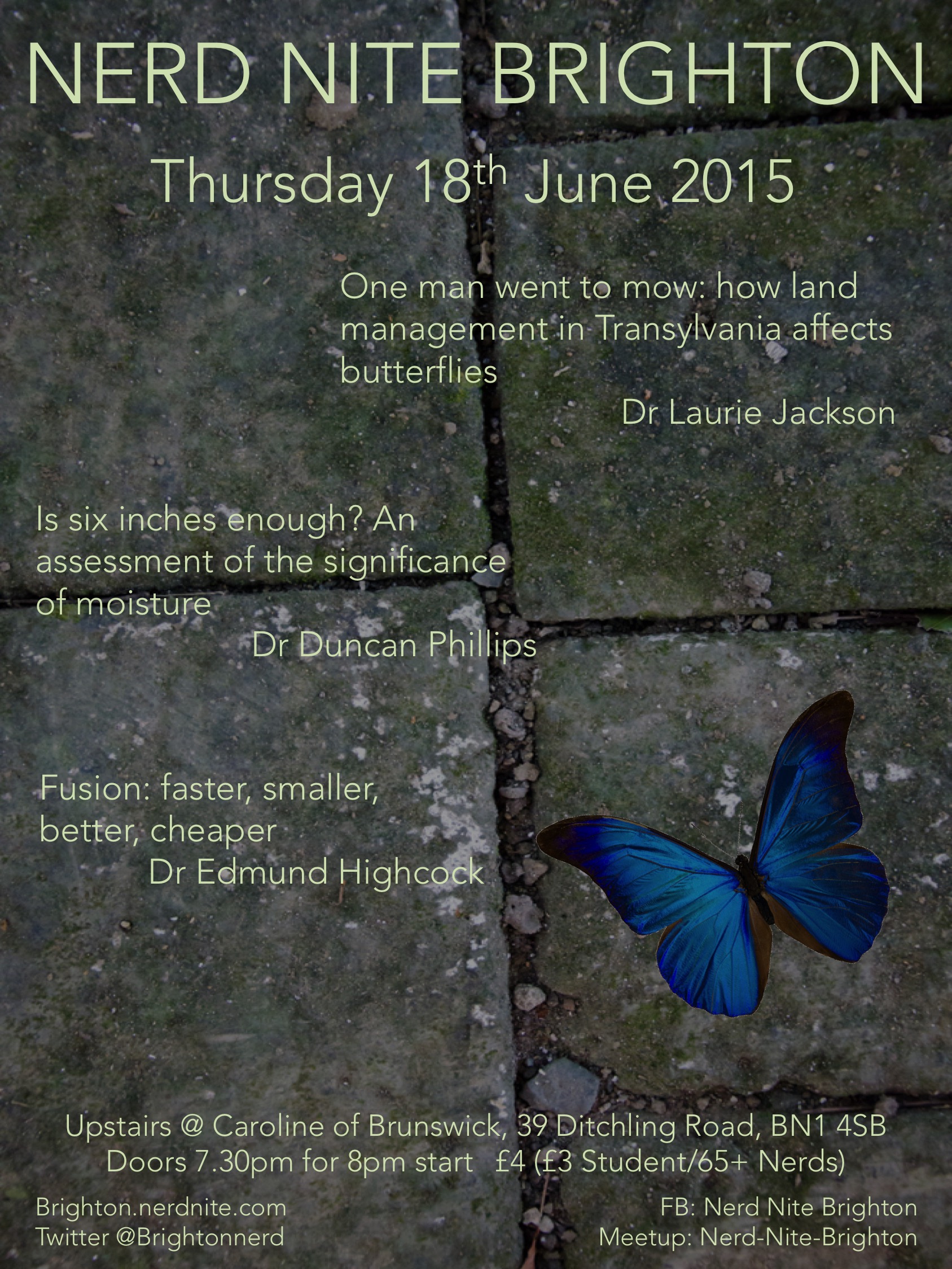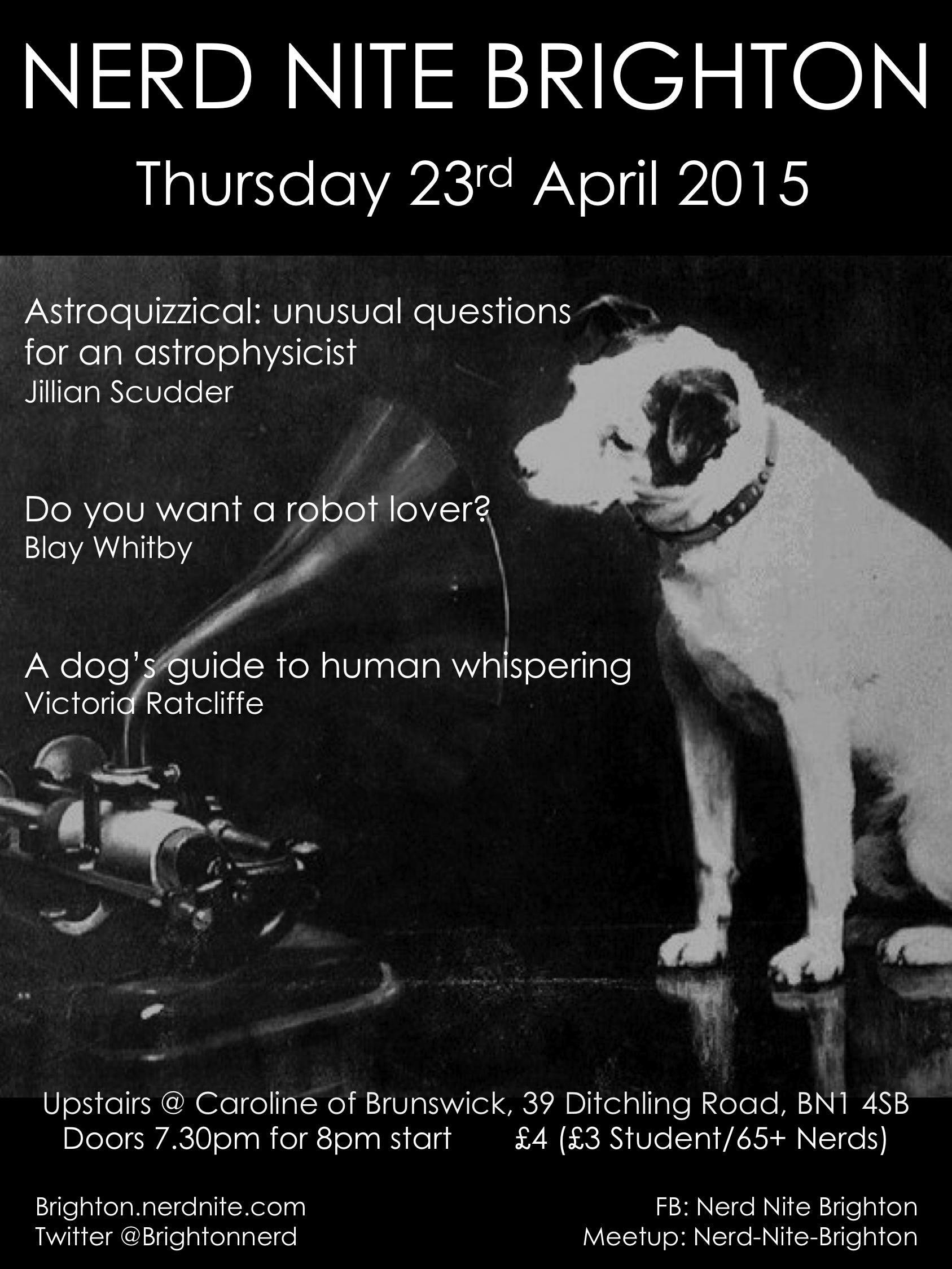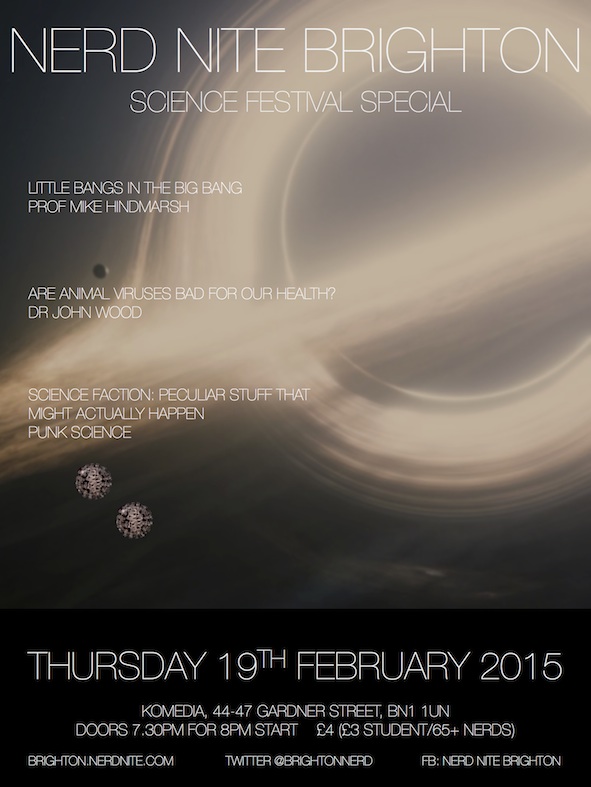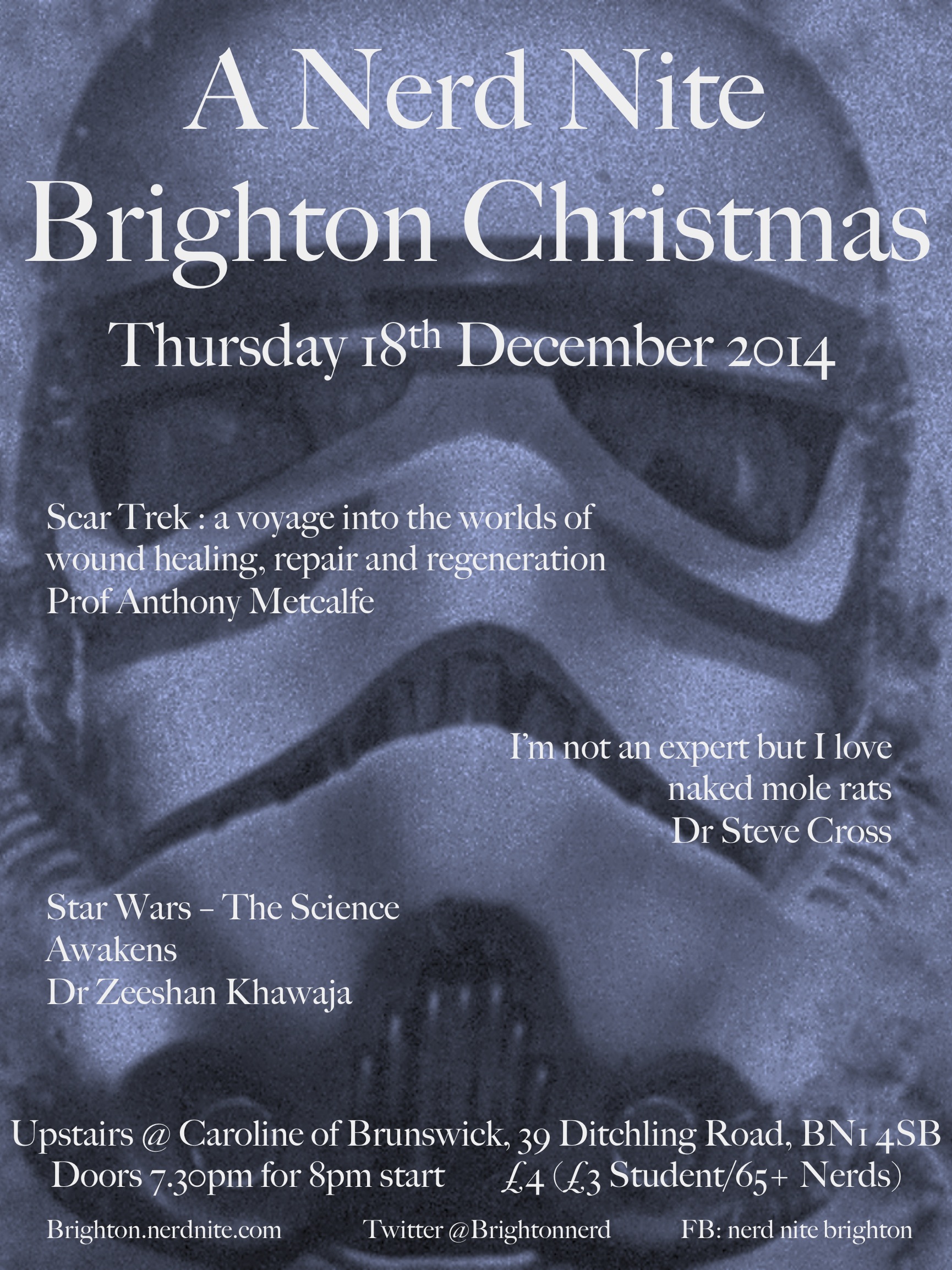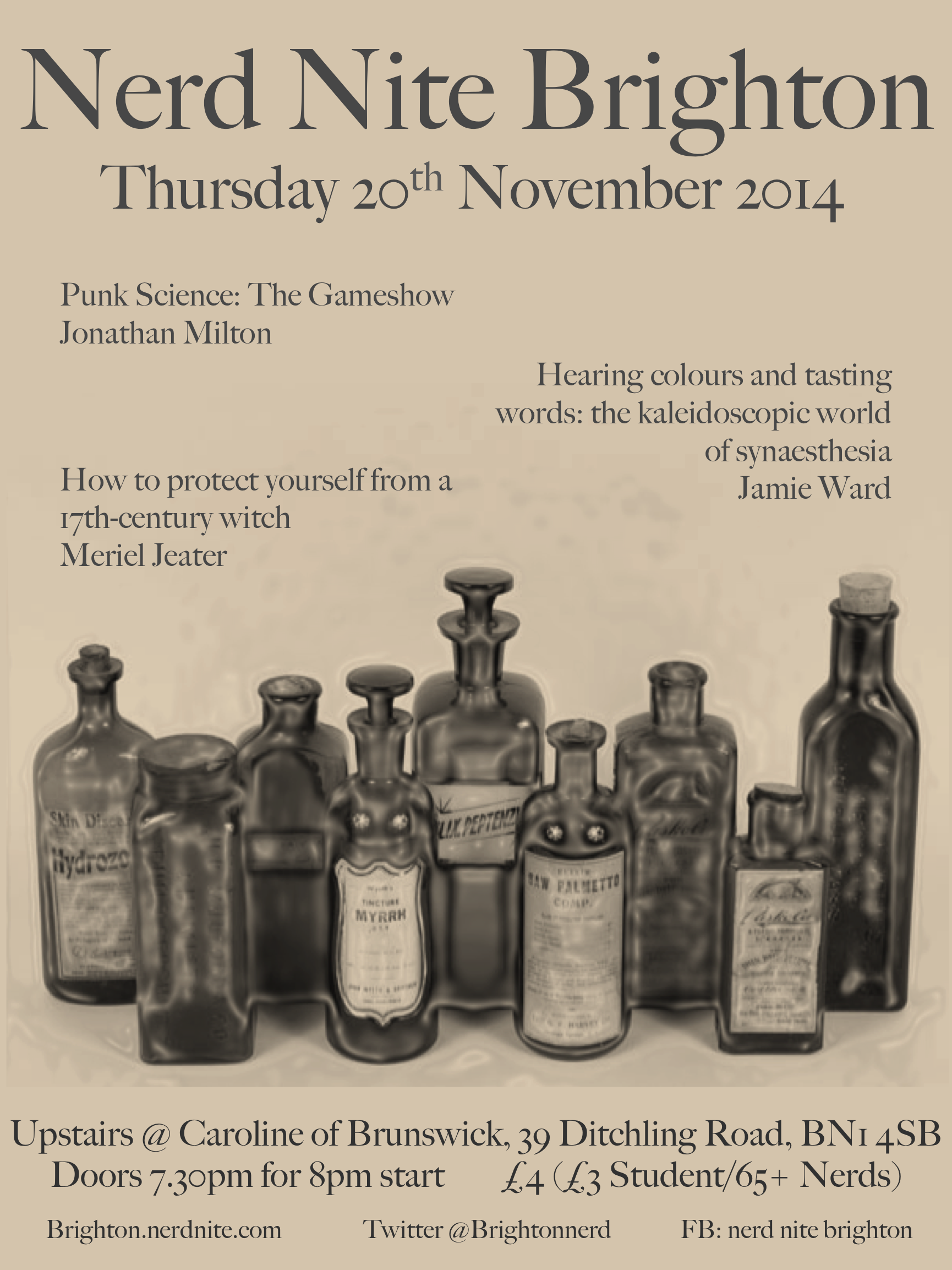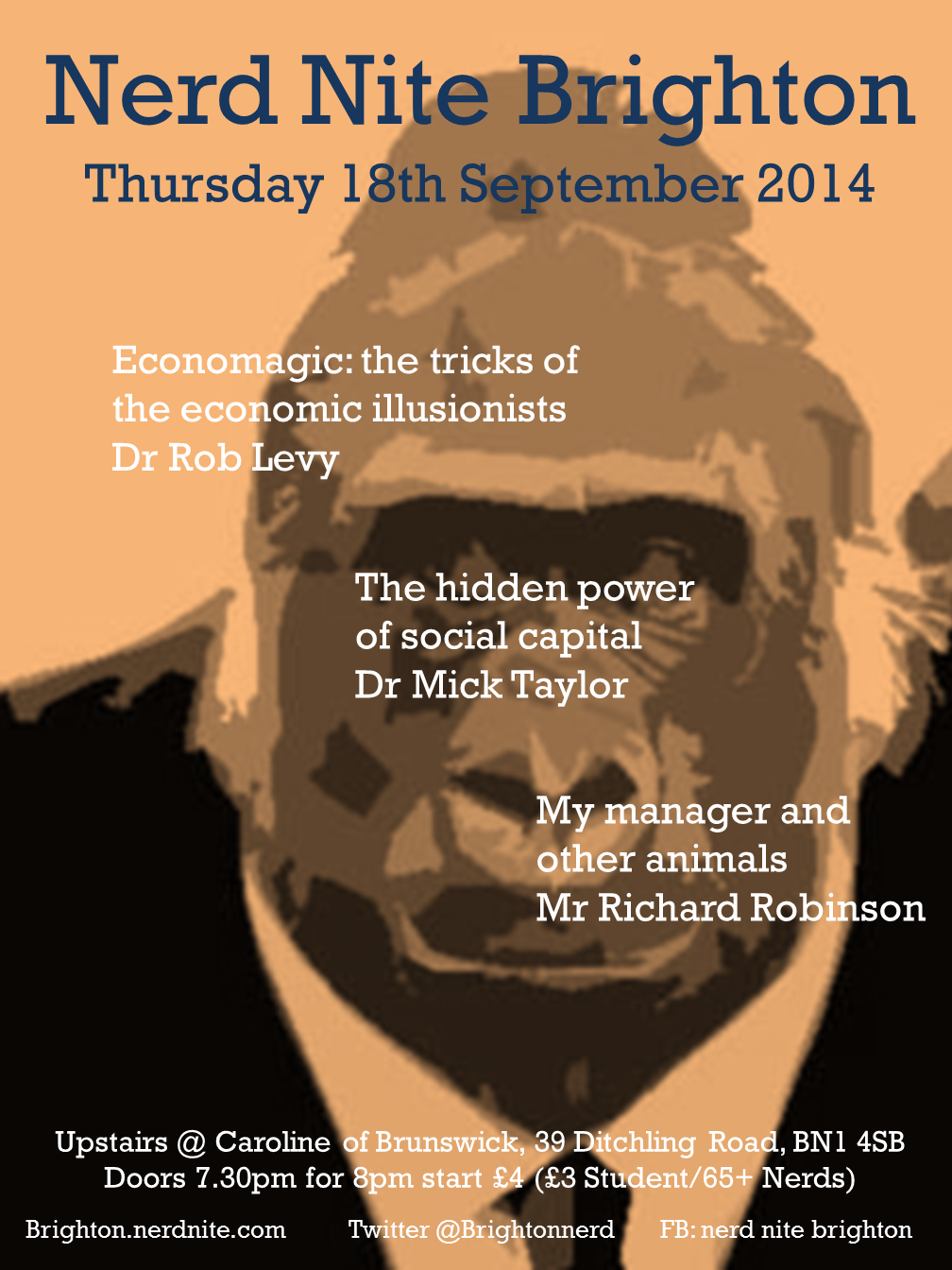Author Archive
Nerd Nite Brighton 22: Beautiful Voices, Young Galaxies and Furry Friends
It’s almost time for August Nerd Nite. The south coast weather will ultimately disappoint you but we certainly won’t. This month:
1. The Anatomy of Singing – Dr Malcolm Johnston
Malcolm will be describing the advances in modern imaging techniques that allow us to gain more detailed images of human vocal anatomy combined with a discussion on how the human vocal apparatus has evolved to allow the most advanced vocalisation of any mammalian species culminating in the ability to sing.
Malcolm Johnston is a consultant radiologist in Brighton specialising in the diagnosis and treatment of disease using modern imaging techniques. He is also a violinist and singer, and was conductor of the Hampstead symphonia and chorus for 10 years before moving to Sussex. He regularly performs with local music groups and is a keen composer of choral and instrumental music.
2. Exploring the end of the (cosmological) dark ages – Dr Stephen Wilkins
Some few hundred million years after the big bang the Universe was illuminated by the first stars and galaxies thereby bringing an end to the cosmological dark ages. In recent years, thanks to a reinvigorated Hubble Space Telescope, we are able for the first time to detect galaxies present only a few hundred million years after the big bang. Our understanding of this period of the Universe’s history will grow dramatically over the next decade thanks to range of new facilities coming online, including the James Webb Space Telescope (the successor to Hubble), the European Extremely Large Telescope and the Square Kilometre Array.
Dr. Stephen Wilkins is an astrophysicist and lecturer at the University of Sussex. Steve grew up in Yorkshire, completed his undergraduate degree in Durham, and his PhD at the Institute of Astronomy at the University of Cambridge. He subsequently worked at the University of Oxford before moving to the Sussex in 2013. His speciality is understanding, both observationally and theoretically, how the first galaxies formed and evolved.
3. The wild furry urbanites – Dr Dawn Scott
Foxes, badgers and hedgehogs are becoming very much a part of our urban ecosystems and relationships between humans and urban wildlife can be complex. Dawn has been studying how humans and wildlife interact in urban areas in Brighton and Hove for several years, sometimes closely followed by a film crew. In this talk Dawn will share why she finds studying urban wildlife and human behaviour so fascinating, some of her findings of what happens after dark in Brighton, and how to balance the needs of the science with the needs of the media.
Dawn is the Head of Biology and Biomedical Sciences at the University of Brighton. Her research interests are in ecology and conservation of mammals, specifically carnivores and resolving human-wildlife conflict. She has a PhD in mammal ecology and has undertaken carnivore research in several countries including Jordan, Chile, Indonesia and South Africa. She has appeared on several television programmes including Channel 4’s Foxes Live and BBC Springwatch on fox and badger features and is passionate about citizen science and science communication.
_____________________________________________
Cake, Drinks, Music, Quizzing and some wonderful nerdy people as usual
(£4 regular nerds, £3 student/65+ nerds)
doors 7.30pm, 8pm start
upstairs at the Caroline of Brunswick
Nerd Nite Brighton 21: brains & bodies, fairy tales, living without stuff
Ta da! Join us for some summer nerdanigans on July 16th:
1. Brain-body interactions in emotion and cognition – Cassandra Gould
Cassandra will be presenting the research focus of her lab: the interplay between the brain and the body. She will guide you through some of the latest research, discuss how the brain-body relationship effects our thoughts and emotions, and how this relationship may be altered in different psychiatric conditions.
Dr Cassandra Gould is a neuroscientist and researcher at Brighton and Sussex Medical School. Cassandra has a BSc in Biological Sciences (Uni. of Brighton), an MSc in Cognitive Neuropsychology (UCL) and a PhD in Informatics (Uni. of Sussex, Sackler Centre for Consciousness Science). Cassandra has always been a nerd, and now she gets to be one for a living.
2. Fairy Tale Politics: Ideological Applications of Popular Narrative Traditions – Andrew Teverson
We think of fairy tales as being otherworldly, but these magical narratives have always had political functions, both because they shape our perceptions about the world from an early age, and because writers find it relatively easy to adapt fairy tales to polemical purposes. Andrew Teverson considers the social and political applications of two well-known European traditions: the English chapbook narrative ‘Jack and the Beanstalk’ and the French story ‘Barbe bleue’ (Bluebeard).
Andrew is Professor of English Literature and Associate Dean of the Faculty of Arts and Social Sciences at Kingston University. His recent books include a critical introduction to fairy tales for Routledge’s New Critical Idiom series (2013) and a two-volume coedited edition of the selected works of the Victorian folklorist and fairy tale collector Andrew Lang (Edinburgh University Press, 2015).
3. How To Be Radical: Lessons Learnt From Living With 100 Things – Jonathan Munn
In January 2012 Jonathan gave up all his life possessions and started his new life with only 100 things. What he didn’t realise is how such a simple step would completely change his life forever. In his presentation Jonathan will take you on his journey and share his insights into the value of starting, accountability and how to overcome your fear to ensure that you’re getting the most from you! Are you ready to do something radical?
with super guest host mathemeconomist Dr Mick Taylor!
______________________
£4 regular nerds, £3 student/65+ nerds
Tickets ONLY AVAILABLE ONLINE from here
Cake, music, quizzing (glasses on/off) as usual
doors 7.30pm, 8pm start
upstairs at the Caroline of Brunswick
Nerd Nite Brighton 20: Transylvanian butterflies, magnetic fusion and a moist six inches
There was some sort of festival happening in Brighton last month – we hope you didn’t miss us too much…
Anyway it’s far too hot outside so come and join us for another action (for nerds) packed evening.
Our talks this month:
One man went to mow: how land management in Transylvania affects butterflies – Dr Laurie Jackson
Land management change is one of the major causes of declining biodiversity. Transylvania in Romania is characterised by a traditional system of land management that has maintained a rich natural environment, including a diverse array of butterfly species. Since 2010 a team of researchers from Leuphana University of Lüneberg have been researching these ancient agricultural landscapes to identify ways in which sustainable development can be fostered in this area.
In order to develop effective conservation strategies, it is essential to understand how species use a landscape. Butterflies are a group that respond rapidly to environmental change and as such are often considered to act as an indicator species. This study in Transylvania aimed to understand the important factors in determining the richness of butterfly communities in the area, and how this should be applied to their conservation.
Laurie is an ecologist based in Sussex who never tires of learning about the natural environment. She has a range of experience from working with landowners to bat surveys and leading wildlife travel holidays. Laurie has a passion for ecological research and tries to involve herself in projects whenever someone will let her. During 2012 and 2013 she got lucky, as Jacqueline Loos of Leuphana University of Lüneberg did just that contracting her as a research assistant on a study of butterfly movements in Transylvania.
Fusion: faster, smaller, better, cheaper – Dr Edmund Highcock
Edmund is a theoretical plasma physicist at the University of Oxford who is trying to figure our how to get Magnetic Confinement Fusion (generating fusion power using magnetic fields) going.
Edmund’s three year position as a research Fellow at Magdalen College involves studying ways of eliminating turbulence from fusion plasmas and thus improving the performance of current and future fusion power generation reactors.
Is six inches enough? An assessment of the significance of moisture – Dr Duncan Phillips
Modern construction is fundamentally different to historic construction in many ways but one single fact is more significant than all the others – moisture. Modern houses are expected to be dry. Old houses are inherently damp. This presentation will look at how historic building construction has changed over the centuries, what can go wrong when houses are not looked after properly and why six inches is such an important size that really does matter.
It’s an absolute delight to welcome back Duncan, Building Surveyor extraordinare, to Nerd Nite. Some of you might remember his talk “Should the Death Star be a Listed Building?” way back in March 2014. Look forward to some more building shenanigans from the endurance athlete/Old Thumper ale enthusiast
_________________________
Quiz, cake, drinks, music as de rigeur
Tickets ONLY available online from here
Doors at 7.30pm for an 8pm start
£4 regular nerds £3 student/65+ nerds
Nerd Nite Brighton 19: Talking dogs, space questions, robot lovers
It’s that time again!
Our fabulous talks this month:
1. Astroquizzical: unusual questions for an astrophysicist – Dr Jillian Scudder
Astroquizzical began 3 years ago as an open forum for people to anonymously submit their questions about the Universe, and receive a reasonably complete, clearly worded reply in exchange. Astroquizzical has since fielded questions about the plausibility of movie and video game scenes, some technical explanations, and many questions which begin “what would happen if…”. This talk will walk you through some of the least anticipated questions Astroquizzical has received, and their answers.
Dr. Jillian Scudder is an astrophysicist currently working as a postdoctoral research fellow at the University of Sussex. Jillian grew up in Florida, completed her undergraduate degree in Minnesota USA, and her PhD in Victoria, Canada, and is now in the UK. Her specialty is in studying the way galaxies evolve, through collisions and over time. Astroquizzical is an outreach project she runs in her spare time, where she answers questions from the general public about anything to do with space.
2. Do you want a robot lover? -Dr Blay Whitby
Would you like to have sex with a robot, or maybe just fool around a little bit? Do you think you could fall in love with one? Could a robot ever love you back? And would you do unspeakable things to a robot that you would never do to a human? But then might you start doing them to a human just because you’ve already done them to a robot and now the line is getting blurry? These are the questions Dr. Blay Whitby will help you answer in this highly entertaining talk.
Dr. Whitby is a philosopher and ethicist concerned with new and emerging technologies and their social and humanitarian impact. He is a member of the Strategic Ethics Committee of BCS The Chartered Institute of IT and ethical advisor to the Royal Academy of Engineering. Widening public engagement in science through debate is important to him.
3. A Dog’s Guide to Human Whispering – Victoria Ratcliffe
Most dog owners have probably found themselves thinking that their dog understands them better than most people. That’s until requests wash ineffectually over their heads and it seems apparent that they haven’t got a clue what they’re being told. People still seem determined to speak to their dogs but how much do they actually understand? Victoria will be discussing the recent exciting advances in dog behavioural research, including the work she is currently doing at Sussex University, which is just beginning to uncover what is actually going on in our furry friends’ heads when we speak to them. She hopes to convince you that they are listening, and may understand more than you might have thought!
Victoria is currently working towards her PhD at the University of Sussex under the guidance of her supervisor, Dr. David Reby, investigating ‘how dogs hear us’. Domestic dogs are particularly well suited to explore communication between species, as they often gain extensive natural experience in communicating with humans. By investigating how dogs perceive human voices we can not only improve our communication with them, but also increase our understanding of how unique our own thought processes are and how much they are actually shared with other mammals.
_______________________________
Cakes, quizzes, music, drinks and our special guest host Dr Mick Taylor!
Doors at 7.30pm for an 8pm start
Tickets £4 for regular nerds and £3 for the student/65+ nerds
Upstairs at the Caroline of Brunswick
_______________________________
Tickets from HERE
Please please note that we sell out every month now so strongly advise you to buy tickets online early! We have a few we reserve for sale on the night but again they disappear very quickly
Nerd Nite Brighton 18: Paint Pigments, Unwell Animals and Antarctic Astronomy
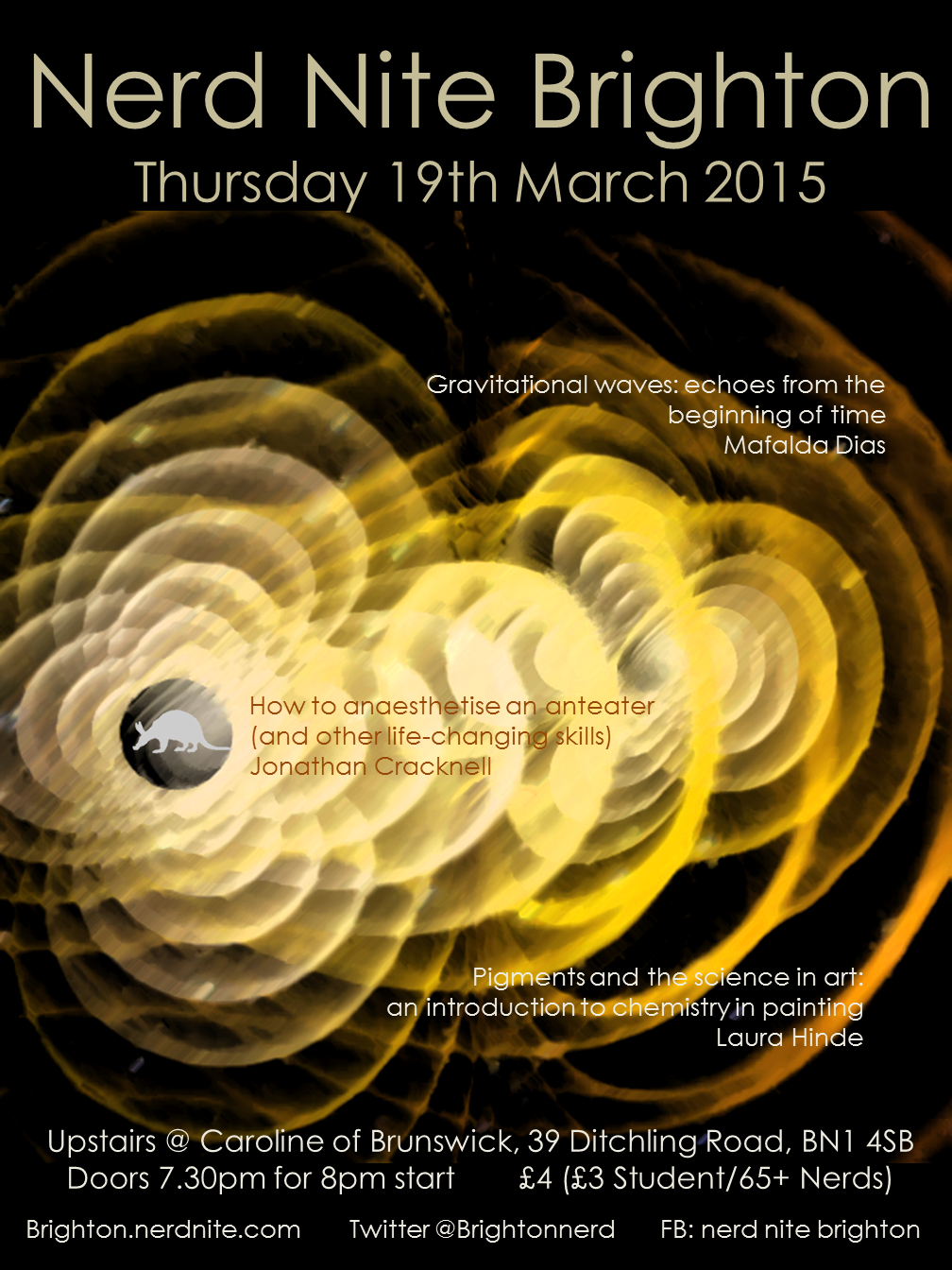 Well it seems like just yesterday we were all excited about our February Science Festival Special. If you missed it there are some pics on our Facebook site
Well it seems like just yesterday we were all excited about our February Science Festival Special. If you missed it there are some pics on our Facebook site
And now March has come round! Time is a bloody fast arrow.
This month:
1. How to anaesthetise an anteater (and other life-changing skills) – Jonathan Cracknell
Wildlife anaesthesia is an essential part of any conservation or health management programme when working with wild animals. This offers a range of challenges from how to sex a beaver, to undertaking an epidural in an elephant, but none so more than knowing how to intubate an anteater. This talk will like at the diverse challenges facing the modern zoo and wildlife veterinarian and most importantly answer that elusive question – how do you intubate an anteater?
Jonathan has had a varied career having worked in general practice, as an emergency and critical care clinician, a resident in anaesthesia at the Animal Health Trust, and as a wildlife and zoological medicine clinician internationally. His primary interests are conservation led initiatives, anaesthesia and welfare, and capacity and capability development for NGOs in Asia. He currently holds the post of Director of Animal Operations at Longleat Safari and Adventure Park.
2. Gravitational waves: echoes from the beginning of time – Mafalda Dias
The recent suggestion that gravitational waves as old as the Universe have been observed in the south pole shook up the physics community. But what are these strange waves? How can they be seen from the South pole? Why would their discovery be a turning point for fundamental physics?
Mafalda is a theoretical cosmologist at the University of Sussex. Her research examines the physics that might underpin very early Universe by studying the mechanisms that has given rise to the structures we can observe today. She is enthused by the prospect of using observations of the sky as a laboratory to probe fundamental physics. She completed her undergraduate studies in Porto, her hometown, before moving to Brighton for her PhD. As a good lover of fundamental science, she takes enormous pleasure in solving all sorts of riddles and mathematical puzzles, and folding origami.
3. Pigments and the Science in Art; An Introduction to Chemistry in Painting (with reference to a popular card game from the 1970s) – Laura Hinde
This talk will introduce nerds to material science by presenting various pigments used in historic paints, focussing on some unusual and possibly surprising ingredients. The wonders, the dangers, the chemistry of paints and all their glorious hues will have you looking at paintings in different way.
Laura Hinde is Paintings Conservator at the National Portrait Gallery. This means she likes fixing things and cleaning. Her research has her spending most of her time looking at things close up; paint, canvas, wood, pigments. She loves a microscope. She also likes Top Trumps. She graduated from Leeds University in 2004 BA in Italian and Art History. After a few years of this and that she went on from sweeping floors at a conservation studio to a Postgraduate Diploma in the Conservation of Easel Paintings at the Courtauld Institute of Art, London. She has been working as a paintings conservator at the National Portrait Gallery since 2010, where the lunchtime Craft Club is thriving. She also does painting conservation on a freelance basis.
_________________________________
We are back at our regular home (Caroline of Brunswick).
As always there will be free cake, tunes and big prize quizzes.
Tickets are £4 for a regular nerd and £3 for a student/over 65 nerd
Buy them from here
Remember we sell out EVERY MONTH now so strongly advise that you buy tickets online to avoid disappointment!
Looking forward to seeing you there!
Brighton Science Festival Special – 19/2/15
OMG it’s Brighton Science Festival time!
We are doing a SciFest special this month and we are being kindly hosted by the lovely folk at Komedia. We’ve bagged their main space so there’ll be plenty of room to stretch out.
Our line-up:
1. Little bangs in the Big Bang – Prof Mark Hindmarsh
What connects your kettle with the Higgs and a laser interferometer in space? Professor Mark Hindmarsh, a particle cosmologist at the University of Sussex, will turn the clock back to the first few picoseconds to explain.
2. Are animal viruses bad for our health? – Dr John Wood
There are many viral diseases of wild animals, most of which are unremarkable and have little impact on us. However some can jump into humans and create alarm and panic like Ebola and bird flu. John Wood will review these nasty viruses and explain what ducks, fruit bats, camels and civets all have in common.
John Wood was an influenza virologist at a World Health Organisation (WHO) laboratory in Hertfordshire. He advised the WHO on pandemic flu vaccines and led a laboratory engaged in developing vaccines against H5N1 viruses.
3. Science Faction: Peculiar stuff that might actually happen – Punk Science
We’re delighted to have The Science Museum’s resident comedy team Punk Science triumphantly return to Brighton for some more shenanigans. This time they’ll be examining how much science-fiction might actually have a basis in hard science. If previous experience is anything to go by there will be a lot of silliness perhaps with some abnormal sign language and crisp eating.
Do make sure you pop up and see them in the Big Smoke as part of the Science Museum’s Lates programme throughout the year.
We will be sure to have the usual music, cake, quizzes and laughter
Doors at 7.30pm for an 8pm start
£4 for regular nerds and £3 for NUS/65+ Nerds
Tickets from HERE
A Nerd Nite Brighton Christmas
We have some festive Nerd Nite fun for you so forgo your work Christmas do (it’s always rubbish and you wonder why you go) and head on over to the Caroline of Brunswick to celebrate the holiday season with your favourite nerdy friends.
This month
1. Scar Trek: A voyage into the worlds of wound healing, repair and regeneration – Prof Anthony Metcalfe
Scarring following wounding is a major medical problem. In burns, traumatic wounds or surgery that leads to extensive tissue loss scarring often results in adverse medical consequences including loss of function, restriction of movement (particularly because of contractures over joints), restriction of growth, poor aesthetics and adverse psychological effects.
Tony is Director of Research at the Blond McIndoe Research Foundation and a Professor of Burns and Wound Healing Research and founding member of the Brighton Centre for Regenerative Medicine. In this talk, Tony will discuss some of the new technologies being developed to repair wounds and scars left by burns, trauma or surgical interventions.
2. I’m not an expert but I love naked mole rats – Dr Steve Cross
A couple of years ago Steve accidentally became interested in naked mole rats, the greatest animal ever discovered. This talk will explain how they are both the potential medical saviours of humanity and badly-behaved social media users.
Dr Steve Cross is a science comedian and the founder of Bright Club and Science Showoff. Amongst the stupid things he has done in his career are printing out the entire human genome, buying 500 diet books and trying to MC after 10 whiskies and no dinner.
3. Star Wars: The Science Awakens – Dr Zeeshan Khawaja
What would actually happen if you tried to make the Kessel Run in 12 parsecs? Could Bear Grylls Solo use a tauntaun? Could you attract the Millenium Falcon? We’ll almost certainly not answer any important questions but frankly after the new trailer who cares – let’s once more visit a galaxy far, far away.
Zeeshan Khawaja has seen the new trailer for Star Wars VII too many times and still thinks that he is not too old for Yoda. In the mean time he is a cardiologist in Brighton having previously been studying for his PhD in coronary physiology and computational modelling at King’s College London which have little if anything to do with tractor beams.
________________________________________
With free cake, tunes and big prize quizzes and a double act hosting in the shape of Drs Jane Hume and Alice Roueche, what more could you want?
£4 for regular nerds and £3 for you lucky student/65+ nerds. Get your tickets here
We sold out well in advance last month as the venue only just holds 65 so please please please get them early through the link below to avoid disappointment. (We get very sheepish, embarrassed and sad when we have to turn people away at the door…)
Doors at 7.30pm for 8pm start
Looking forward to seeing you there!
Nerd Nite Brighton #15: 20/11/14 – Hearing colours, information punks and witch defence
The nights are hitting us earlier and those summer smiles are starting to look a bit downturned. Even an extra an hour in bed doesn’t seem to make up for it. Why not give yourself a little winter pep and swing by for three more scintillating talks, quizzes, music, drinks with friends and all the cake you can eat at our next instalment. We’re joined by some emissaries from London’s big hitter museums as well as a heavyweight from our very own University of Sussex.
This month:
1. Punk Science: The Gameshow – Jonathan Milton
Jon is part of the Science Museum’s resident comedy team Punk Science and will be presenting a sneak preview of their latest show. The theme is based around The Science Museum’s new gallery “Information Age.” You might have seen the Queen tweeting from the opening. It’s up to the lucky contestants who will be selected at random to compete in science themed games and brain-melting quizzes to win big prizes and that is a fact.
Featuring Punk Science’s trademark blend of science, comedy and music now with added gameshow-flavoured cheese. In Punk Science: The Gameshow, nobody goes away empty headed…
Do pop up and see them as part of the Science Museum’s Lates programme later this month and in January.
2. Hearing colours and tasting words: the kaleidoscopic world of synaesthesia – Jamie Ward
People with synaesthesia experience the ordinary world in extraordinary ways. For some people each letter has its own distinct colour; for others, words have tastes or music is an animated spectacle. In this talk Jamie will explain what causes synaesthesia and how we can study it scientifically. He will discuss how it can often be advantageous and what it reveals about the workings of the typical mind and brain.
Jamie Ward is a Professor of Cognitive Neuroscience at the University of Sussex. He is one of the world’s leading authorities on synaesthesia and his research methods draw on experimental psychology and human neuroscience.
3. How to protect yourself from a 17th century witch – Meriel Jeater
Meriel Jeater from the Museum of London, explains some of the charms against witchcraft used in the 17th century, from strangled chickens to bottles filled with urine and nail clippings. Find out how to keep a witch’s imp out of your chimney and other useful tips.
Meriel has been a curator at the Museum of London for 14 years, working in the Archaeology Collections Department (450,000 BC – AD 1700). She works mainly on the Roman, medieval, Tudor and 17th century collections but has been known to delve into prehistory when required.
____________________________
Tickets from here at the usual £4 for regular nerds and £3 for students/65+ nerds
Can’t wait to see you there!
Nerd Nite Brighton #14: 18/9/14 – Animals at work, new money and lying economics
We’re back on September 19th for some more seaside nerdery. This month:
Economagic: the tricks of the economic illusionists – Dr Rob Levy
How do you saw a deficit in half? How do you pull a recovery out of a hat? How can you stick real steel swords into your own economy and still have it alive and kicking in time for the next election? UCL Economagician Rob Levy takes you behind the scenes at Number 11 Downing Street, revealing the secrets behind these amazing conjuring tricks and demystifies some of the phoney baloney around the UK’s magical new growth figures.
Rob Levy is an economist at UCL. He knows how to moonwalk, clap in triplets and solve mathematical equations. He is not machine; he is man. He will fight you; he will win.
The hidden power of social capital – Dr Mick Taylor
In an age of rapid data transfer, global finance and the insatiable demand for ever-increasing returns on capital, we often reduce our view of the world to one of numbers. If something can’t be measured or counted we often deem it unimportant. This has resulted in some of the most fundamental aspects of human society being ignored or underestimated, things such as shared identity, trust and reciprocity.
Social capital holds much untapped power. This talk explores how technology can be used to co-create and leverage social capital to enable individuals and enterprises to collaborate and build the thriving, resilient and sustainable economies and communities we need to face the uncertainty of tomorrow’s world.
Mick is a former teacher of mathematics with a PhD in mathematical epidemiology, studying how changes in social structures and human behaviour can lead to different outcomes in the event of a disease outbreak. Mick is fascinated by human systems, particular in monetary systems and how the design of our money supply impacts on all aspects of human life.
My manager and other animals – Mr Richard Robinson
Deep down, we’re just like animals. Some of us are selfish like apes. Some are chaotic like ants. . . And somehow the two clash and coalesce in ‘antagonistic harmony’. My Manager & Other Animals examines the evolutionary psychology of work, focusing on the office, workshop, corporation or government department, and the complex and fascinating evolutionary tactics that have developed to deal with working life.
Richard Robinson is a puppeteer and worked on television series like Spitting Image. Before his puppeteering career, he was a busker. In the mid-1990s, after years taking his children to the Science Museum and related educational events he found a new outlet as a science busker, visiting schools and festivals with science cabaret acts. He has written nearly twenty books on science. His SCIENCE MAGIC books were shortlisted for the Royal Society’s science book prize 2000. He is the curator of our very own Brighton Science Festival.
No cake this month. ONLY JOKING! and there’ll be music and quizzes too!
Tickets on sale here
£4 Regular Nerds, £3 NUS/65+ Nerds
Upstairs at the Caroline Of Brunswick – Doors at 7.30pm
See you on the 21st!
Nerd Nite Brighton #13: 21/8/14 – Hypnosis, Tasty Computers and Tiny Doctors

If you’ve been keeping an eye on the news in the last few weeks then you’ll have seen how the world is a pretty depressing place right now.
We can’t fix the world but our three great speakers this month will be reminding us that, whilst we do terrible thinngs to each other, humans are capable of some amazing feats and achievements.
Innerspace: Miniaturisation in medicine – Dr James Cockburn
James qualified in medicine from Imperial College, London in 2000 before undertaking general medical training at Guy’s and St Thomas’ Hospitals. He completed postgraduate research in vascular biology at King’s College London before specialising as cardiologist. He is currently Consultant Cardiologist at the Royal Sussex County Hospital here in Brighton fixing broken hearts.
Medical technology has advanced at an incredible pace with diagnostic tools and treatments existing today that would have been hailed as science-fiction in the past. James will tell us about how miniaturisation has been key to these advances using his specialty of interventional cardiology as an example.
The science of hypnosis: Myths and facts – Prof Zoltan Dienes
Hypnosis is a valuable clinical tool, but much information on TV, the net, in print, and indeed sometimes taught in non-academic hypnosis classes is misleading. This is unfortunate because while there are still many things we do not know about hypnosis and there are still unresolved controversies, there is clear evidence settling some common questions about the nature of hypnosis. In his talk Zoltan will debunk some myths and indicate what we do know and what we don’t.
Zoltan is Professor of Psychology at the University of Sussex. He has published over 100 scientific papers on the nature of unconscious processes, and written two books, one on unconscious (implicit) learning and the other on the philosophy of science and statistics. He runs a hypnosis lab at the University, where anyone can be screened for their hypnotisability.
Integrating Taste into Interactive Technologies: Science or Science-Fiction? – Dr Marianna Obrist
Despite the fact that interactive technologies have permeated our environment and have become an essential part of our everyday life, the way we interact with them is still limited. Interactive systems stimulate dominantly our senses of vision and hearing, partly our sense of touch (e.g., vibration in mobile phones), while our senses of taste and smell are widely neglected and under-exploited in Human-Computer Interaction (HCI) research. In this talk, Marianna Obrist will talk about her research on multi-sensory experiences for interactive technologies with a special focus on the integration of taste into future interactive technologies.
Marianna Obrist is a Lecturer in Interaction Design at the University of Sussex at the School of Engineering and Informatics. She joined Sussex after spending two years as a Marie Curie Fellow at the Culture Lab of the School of Computing Science in Newcastle University. Before that Marianna was an Assistant Professor for Human-Computer Interaction and Usability at the Department of Computer Science at the University of Salzburg, Austria. The focal point of her research is to create a rich and systematic understanding on users experiences with interactive technologies. Recently she investigates the design spectrum for touch, taste, and smell experiences for interactive technologies. More details are available here: http://obrist.info/ and http://multisensory.info/
We wouldn’t forget the cake and the quizzes and the music of course.
Tickets on sale here
£4 Regular Nerds, £3 NUS/65+ Nerds
Upstairs at the Caroline Of Brunswick – Doors at 7.30pm
See you on the 21st!
